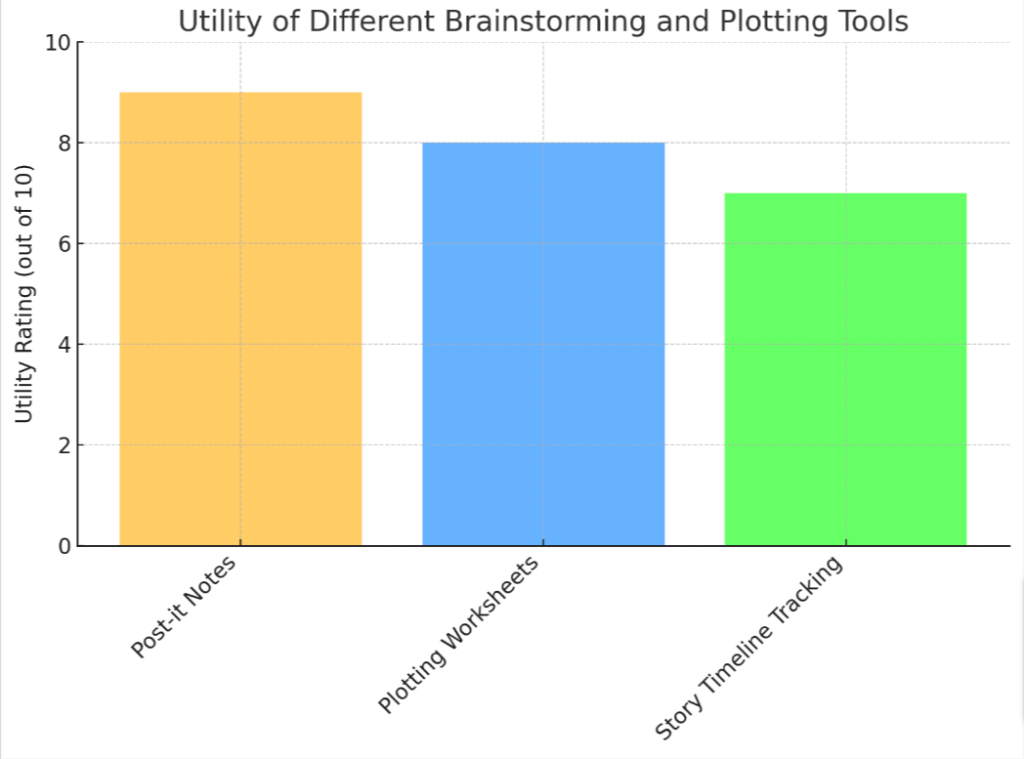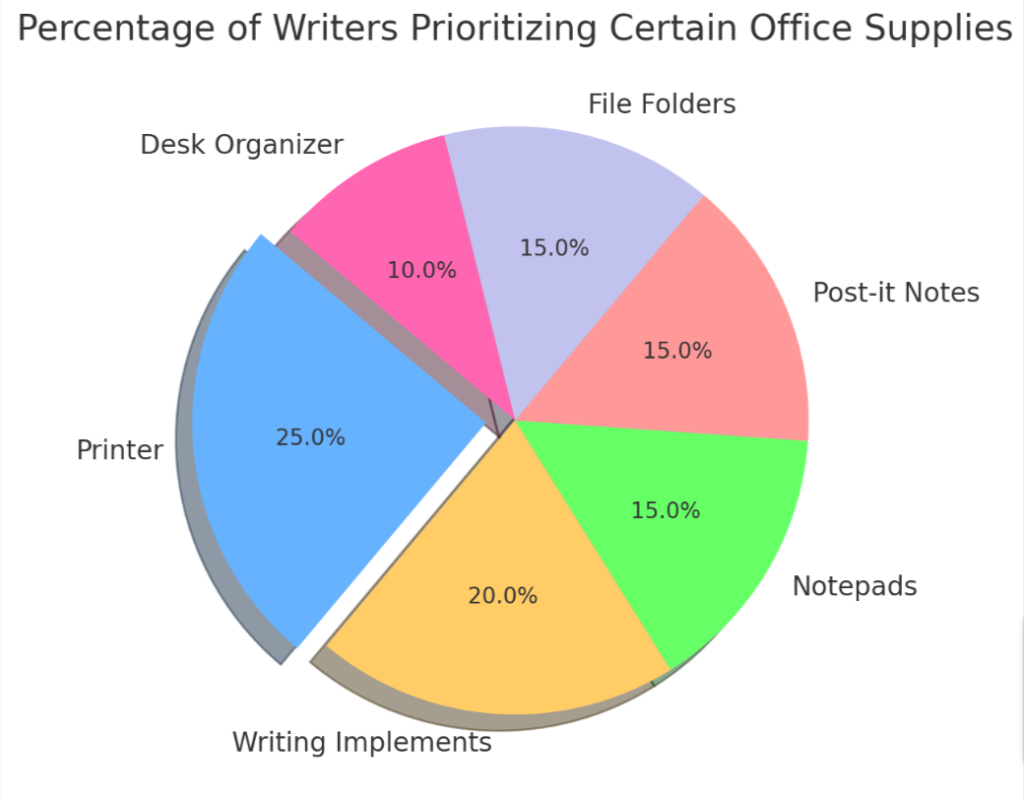Writer’s Toolkit: Top Office Supplies for Enhanced Productivity
Are you a writer struggling to gear up your workspace? Despite the digital age, physical office supplies remain crucial for every writer’s productivity. This article will guide you on stocking your writing space with essential items for jotting down ideas, organizing plots and staying motivated.
Read on to see how simple tools can revolutionize your writing journey!
Key Takeaways
- Essential office supplies for writers include a printer, writing implements, notepads, post – it notes, file folders, stapler and paper clips, highlighters, desk organizer, printer ink and spare cartridges.
- Limited space options for a writing workspace include ergonomic furniture with integrated storage and wall-mounted organizers to save desk space.
- Tools for brainstorming, plotting, and tracking your writing progress include post – it notes for jotting down ideas, plotting worksheets for organizing story structure,
Setting Up Your Writing Workspace
Setting up your writing workspace is essential for creating a productive and comfortable environment. Basic office supplies such as post-it notes, plotting worksheets, and a story timeline tracker can help with brainstorming and organizing your ideas.
If you have limited space, there are options available to maximize efficiency without sacrificing function.
Basic office supplies
Every writer’s workspace calls for some essential office supplies to ensure smooth and productive work. Let’s dive into the basic tools you might consider:
- Printer: A reliable printer is a must-have, especially for printing drafts or reference materials.
- Writing implements: Regardless of whether you prefer pencils, pens or markers, having a variety on hand can be helpful.
- Notepads: Perfect for jotting down quick ideas or sketching outlines.
- Post-it notes: They are ideal for organizing thoughts and creating a visual storyboard.
- File folders: Keep your documents organized and easy to find with file folders.
- Stapler and paper clips: These help keep pages together when you need them to stick around.
- Highlighters: Crucial for marking important facts, scenes, dialogue or character development in your draft.
- Desk Organizer: To keep your surface tidy and all your tools within reach.
- Printer ink and spare cartridges: It’s always better to have backups!
- Envelopes and stamps: Necessary if you plan on sending out physical manuscripts.
Options for limited space
Choosing the right furniture for a small area can make a difference. An ergonomic chair and desk with integrated storage leave ample room for navigation. Floating shelves offer additional space without crowding the floor.
Even in compact areas, consider noting surfaces such as whiteboards or cork boards.
Wall-mounted organizers are another essential office supply that saves desk space. These products help declutter your workspace while keeping necessary items within reach. A printer on a separate stand or tucked under your desk helps free up more valuable surface area.
Look into multipurpose supplies like pen holders that double as tape dispensers or staplers with built-in paper clip receptacles.
Tools for Brainstorming, Plotting, and Tracking
To aid in brainstorming, plotting, and tracking your writing progress, essential tools include post-it notes for jotting down ideas, plotting worksheets for structuring your story, and a story timeline tracker to keep tabs on plot events.

Post-it notes
Post-it notes serve as practical tools for jotting down swift thoughts or reminders. They can bring a pop of color to dull writing spaces, making them more appealing and engaging. Doodling storyboards, building plot structures or character profiles become easy tasks with these tiny adhesive marvels around.
Writers often stick these notes on their monitors, walls or books enabling quick access to important details during the creative process. Rank ideas or shuffle scenes in your storyline without any hassle using post-it notes!
Plotting worksheets
Plotting worksheets are valuable tools for writers to organize and develop their story ideas. These worksheets provide a structured framework for outlining the plot, characters, and key events of a story.
By filling out these worksheets, writers can easily visualize their storyline, create well-rounded characters, and ensure consistency throughout their narrative. With sections dedicated to character profiles, conflict development, and plot arcs, plotting worksheets help writers stay organized and focused on crafting engaging and cohesive stories.
Story timeline tracking
To keep track of your story’s timeline, make sure to have these essential office supplies on hand:
- Wall calendar: Hang a large wall calendar in your workspace to mark important events and plot points.
- Whiteboard or corkboard: Use a whiteboard or corkboard to visually map out your story’s timeline with sticky notes or index cards.
- Color-coded markers: Assign different colors to different characters or plotlines on your timeline for easy reference.
- Index cards: Write down key events or scenes on index cards and arrange them in chronological order.
- Timelines templates: Use pre-made timeline templates or create your own to visualize the progression of your story.
- Sticky notes: Attach sticky notes with important dates or events to your timeline for quick reminders.
- Digital tools: Explore online tools or software that allow you to create interactive timelines digitally.
- Spreadsheet software: Utilize spreadsheet software like Excel to create a detailed timeline with dates and descriptions.
Staying Organized with a Story Binder and Preparation Box
Create a new novel preparation box to keep all your story essentials in one place. Use a workbook specifically designed for creating antagonists and villains to ensure you have well-developed characters.
Creating a new novel preparation box
Create a new novel preparation box to keep your writing materials organized and easily accessible. Use the following items:
- File folders for character profiles, research, and outlines.
- Sticky notes for jotting down ideas or marking pages.
- Notepads for brainstorming sessions or quick notes.
- Paper clips to keep loose papers together.
- Highlighters to mark important passages or sections in your research.
- A desk organizer to store all your writing supplies in one place.

Workbook for creating antagonists and villains
The workbook for creating antagonists and villains is an essential tool for writers looking to add depth and complexity to their stories. This comprehensive resource provides exercises and prompts to help you develop compelling, multi-dimensional characters that will keep readers engaged.
Whether you’re working on a novel, screenplay, or short story, this workbook will guide you through the process of crafting memorable antagonists who challenge your protagonist and drive the plot forward.
With sections dedicated to character traits, motivations, backstory, and more, this workbook is a valuable resource for any writer looking to create captivating villains.
Other Essential Office Supplies for Writers
Other essential office supplies for writers include fiction writing books, writing prompts, a calendar/planner, writing implements, office storage solutions, and furniture essentials.
Fiction writing books
Improve your writing skills with these essential fiction writing books:
- “On Writing” by Stephen King: Gain insights into the craft of writing from one of the most successful authors in the world.
- “The Elements of Style” by William Strunk Jr. and E.B. White: Learn the fundamental rules of grammar and style to help make your writing clear and concise.
- “Bird by Bird” by Anne Lamott: Discover practical advice on overcoming writer’s block, handling self-doubt, and developing a writing routine.
- “Save the Cat! Writes a Novel” by Jessica Brody: Explore a step-by-step guide for plotting and structuring your novel like a professional screenwriter.
- “Steering the Craft” by Ursula K. Le Guin: Delve into the art of storytelling and learn techniques to improve your narrative voice and writing style.
- “The Emotional Craft of Fiction” by Donald Maass: Understand how to evoke powerful emotions in readers through effective character development and storytelling techniques.
- “Plot & Structure” by James Scott Bell: Master the art of creating compelling plots that keep readers engaged from beginning to end.
- “Self-Editing for Fiction Writers” by Renni Browne and Dave King: Learn how to revise and polish your manuscript for publication, focusing on elements such as dialogue, point of view, and pacing.
Writing prompts
Writing prompts are a valuable tool for every writer. They can help you overcome writer’s block, spark new ideas, and get your creative juices flowing. Here are some essential writing prompt supplies to have on hand:
- Writing prompt books: Invest in a few books filled with writing prompts to keep you inspired and motivated.
- Online writing prompt generators: There are many websites that offer random writing prompts at the click of a button.
- DIY writing prompt cards: Create your own set of writing prompt cards by jotting down different ideas or scenarios on index cards.
- Writing prompt apps: Download a writing prompt app on your smartphone or tablet for easy access to prompts wherever you go.
- Theme-based writing prompts: Focus on specific themes or genres that interest you, such as sci-fi, romance, or mystery.
Calendar/planner
A calendar or planner is an essential office supply for writers to stay organized and manage their writing schedules effectively. It allows you to plan out your daily, weekly, and monthly tasks, deadlines, and appointments.
With a calendar or planner, you can track your progress on various writing projects and set realistic goals for yourself. By having a visual representation of your schedule in front of you, it becomes easier to prioritize tasks and allocate time for different writing activities.
Whether it’s outlining chapters, researching, editing, or marketing efforts, a calendar/planner helps writers stay on track and meet their deadlines without feeling overwhelmed.
Writing implements
Writing implements are essential office supplies for every writer. These tools include pens, pencils, and markers that writers use to put their thoughts on paper. Having a variety of writing implements allows writers to choose the one that feels most comfortable in their hand and helps them express their ideas effectively.
For those who prefer pen and paper over digital methods, having a reliable supply of writing implements is crucial for getting the words flowing smoothly. Whether it’s jotting down notes, brainstorming ideas, or editing drafts, these writing tools are indispensable companions for any writer’s creative journey.
In addition to traditional pens and pencils, there are also specialized writing implements available specifically designed for writers. These may include ergonomic pens or grippers that provide extra comfort during long writing sessions.
Office storage solutions
To keep your office space organized and clutter-free, investing in office storage solutions is essential. File folders are a great way to store important documents, while a desk organizer can help keep pens, paper clips, and other small supplies neatly arranged.
You can also consider using shelves or cabinets to store books, reference materials, and any other items you need within easy reach. By utilizing these office storage solutions, you’ll create a clean and efficient workspace that will boost your productivity as a writer.
Furniture essentials
A comfortable and functional workspace is essential for any writer, and having the right furniture can make a big difference. Start with an ergonomic chair that provides proper support for your back and promotes good posture.
Pair it with an ergonomic mouse to reduce strain on your wrist and hand. Make sure you have a sturdy desk with enough space to spread out your materials. Consider investing in a desk organizer to keep pens, notebooks, and other supplies within reach.
Creating a comfortable environment will help you stay focused and productive as you write.
Conclusion
In conclusion, having the right office supplies is crucial for writers. From basic writing tools like pens and notepads to organization essentials like file folders and desk organizers, these supplies can help writers stay focused and productive.
By setting up a well-equipped writing workspace, using brainstorming tools, and staying organized with a story binder or preparation box, writers can create an environment conducive to their creative process.
So invest in these essential office supplies to enhance your writing experience!

